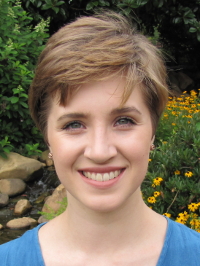2017 SRE Program Participant Profiles: Audrey Hommes
 |
Hometown: Charlotte, NC |
Why did you apply to the SRE program?
I was interested in the field of biostatistics, and this program seemed like a good entry-point for someone to dip their toes into the field, especially because of its focus on more of the mathematical side of data analysis.
What is the purpose of your research?
We are creating an educational simulation of the Cambrian Sea in Unity for students to explore and learn about what life was like at that time. We are trying to create digital resources to be used with the Biology in a Box program so that they are more easily accessible to students in Tennessee. This will mean that more students can participate in the program and learn more about interesting things in the field of biology.
Describe a typical day on the job.
Because of the nature of coding work, my daily schedule is very flexible. Sometimes, if we have a meeting, I'll be out of my apartment by 8:45. Other days, I'll work at home for a while before heading out. My group generally meets with our mentors twice a week, but we will meet up as group mates outside of that. Our meetings can run from 30 minutes long to 2 ½ hours, depending on what needs to be discussed. We will then go our separate ways to work by ourselves on the task we've been assigned. Because I had no previous exposure to Unity, I personally tend to read up on Unity documentation or watch a few tutorials online to better understand how to implement a game idea, and then spend a while trying out different solutions. Sometimes, progress is slower than at other times because of learning curves and different difficulty levels, but eventually, you figure out the solution to the problem and move on to the next one.
![]()
We had lots of interesting lectures and talks that allowed me to really explore what options there are to work in the realm of mathematical-biological synthesis.
![]()
– Audrey Hommes, SRE participant
What new experiences did you gain that have helped you today?
In my project, I learned not only how to code and create a video game, but how to communicate effectively with my group members and how to effectively break up a large project into manageable, achievable pieces to be able to make continuous progress. I feel that, even if I don't end up doing something related to computer science in the future, these skills will help me no matter where I go.
What advice would you give someone who's interested in/curious about participating in the program?
Please don't be self-conscious if you think you're not experienced enough to apply for this internship – I was selected to work on a video game with only a limited exposure to computer science, and I still managed to be accepted and learned a lot. Your dedication to your project and your dedication to learning and improving are far more important than just having previous knowledge of the subject matter.
Would you recommend our program to others?
I would absolutely recommend this program to others interested in mathematics, biology, or the intersection of both fields. Even if you get selected for a project that might be more in the realm of computer science, like mine, you still get a lot of exposure to people in these fields that you can ask questions about their work, and to what working in these fields really looks like today. We had lots of interesting lectures and talks that allowed me to really explore what options there are to work in the realm of mathematical-biological synthesis.
Related Links
Main SRE page
2017 Summer Program
NIMBioS
1122 Volunteer Blvd., Suite 106
University of Tennessee
Knoxville,
TN 37996-3410
PH: (865) 974-9334
FAX: (865) 974-9461
Contact NIMBioS


